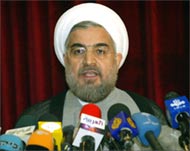UN agency applauds Iran cooperation
UN nuclear chief Muhammad al-Baradai has praised Iran’s cooperation over its controversial atomic programme.

Meanwhile Tehran toughened its rhetoric on Saturday over its ongoing nuclear negotiations with European powers.
“I am saying that we are getting good cooperation from Iran,” the head of the International Atomic Energy Agency (IAEA) said at the World Economic Forum in Davos, Switzerland.
“In the last 15 months we have made good strides in understanding the nature and the scope of its programme,” al-Baradai said, indicating the IAEA had no evidence that Iran was developing nuclear weapons through its atomic energy programme.
Iran talking tough
In Tehran, however, Iran’s supreme leader Ayat Allah Ali Khamenei warned European powers Britain, France and Germany to take their ongoing nuclear negotiations seriously, threatening otherwise to reconsider its cooperation.
|
“Europeans know that Iran under no circumstances will give up enrichment for peaceful purposes” Hasan Rowhani, |
“The Europeans negotiating with Iran should know that they are dealing with a great, cultured nation. If Iranian officials feel that there is no seriousness in the European negotiations, the process will change,” Khamenei was quoted as saying by the Iranian media.
The IAEA has been investigating Iran for two years on US accusations that the country is secretly developing nuclear weapons. US President George Bush said this month he did not rule out military action if diplomacy fails to secure an Iranian agreement not to seek such weapons.
Iran suspended uranium enrichment, the key process that makes fuel for nuclear reactors but also the explosive core of atomic bombs, as a confidence-building measure under a deal clinched in November by the EU three.
Ongoing discussions
Talks between the trio and Tehran on a more comprehensive plan that would include economic ties are continuing, amid reports that the EU had hardened its stance by urging Tehran to completely dismantle its nuclear fuel programme.
But Iran’s top nuclear negotiator, Hasan Rowhani, told the country’s conservative Mehr news agency on Saturday: “Europeans know that Iran under no circumstances will give up [uranium] enrichment for peaceful purposes.
 |
|
No stopping peaceful uranium |
“The European Union, especially the three countries, know that Iran is firm on its decisions and I do not think the Europeans want the negotiations to reach a dead end,” Rowhani said.
Al-Baradai meanwhile said he hoped that the dialogue would be successful, saying it was vital for the United States to join the talks with Iran.
“This issue will not be resolved without face-to-face negotiations,” al-Baradai added, drawing a parallel with US involvement in talks with North Korea on its nuclear ambitions.
No weapons found
Al-Baradai also said IAEA inspectors had yet to uncover any evidence of covert weapons development in Iran.
“As long as we have cooperation, and we do not see a smoking gun, the international community should bear with us,” al-Baradai said.
 |
|
The IAEA has not found illegal |
“We cannot work on the basis of beliefs, we have to work on the facts,” the UN nuclear chief said, while emphasising that the IAEA was currently relying largely on its own equipment, inspections, and information gathering.
Its inspectors were receiving no information or evidence from outside sources, he cautioned, adding: “If people have information and on this basis are coming to the conclusion that this is a weapons programme, then I would very much like them to share it.”
The UN’s nuclear chief also warned of deeper systemic problems with the Treaty on the Non-Proliferation of Nuclear Weapons (NPT), the international regime aimed at preventing the spread of nuclear weapons.
Technological developments meant that a determined country could build a nuclear weapon in a matter of months or a year, he warned, leaving the IAEA little time to react.